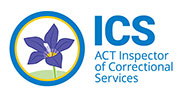About Us
The ACT Inspector of Correctional Services was established to provide independent oversight of ACT correctional and youth detention facilities, focusing on continual improvement and prevention of ill-treatment. The Inspector of Correctional Services does not handle individual complaints, but works cooperatively with oversight entities that do, in order to identify systemic issues and propose constructive recommendations to address these issues.
The Inspector of Correctional Services provides this oversight through conducting reviews of ACT correctional facilities and services, and reviewing critical incidents. Initially this was limited to adult correctional facilities and services. However, in December 2019 this expanded to youth detention, including oversight of Bimberi Youth Justice Centre.
Background to the establishment of the Inspector of Correctional Services
The role of Inspector was established in 2017 with the passage of the Inspector of Correctional Services Act 2017 (ACT) in response to a number of critical incidents that had occurred at the Alexander Maconochie Centre, since it opened in 2009.
In particular, the tragic death of Mr Steven Freeman, a 25 year old Aboriginal man at the Alexander Maconochie Centre on 27 May 2016 prompted an independent inquiry to look into the treatment and care of Mr Freeman. Mr Philip Moss AM was appointed and conducted a review that made a number of recommendations. The Moss review report is entitled “So Much Sadness in our Lives”. The ACT Government’s response to the Moss review included a commitment to establish an Inspector of Correctional Services.
Although the Moss review was the immediate precursor to the establishment of the Office of the Inspector, a number of stakeholders had for a number of years called for a prison inspectorate, including the ACT Human Rights Commission in reviews of ACT’s now closed remand facility, the Belconnen Remand Centre. The establishment of a preventive oversight entity was particularly timely, given Australia ratified the Optional Protocol to the Convention Against Torture (OPCAT) in December 2017, which requires jurisdictions to establish or designate independent entities to provide oversight of places of detention.
